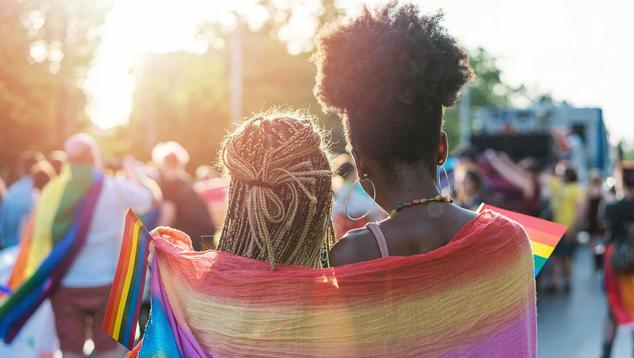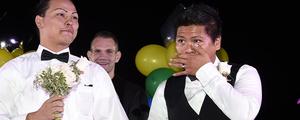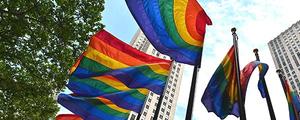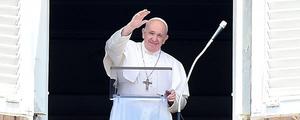The U.S. House of Representatives passed the Equality Act on Feb. 25, and the bill is now undergoing hearings in the Senate Judiciary Committee. The purpose of the Equality Act is to prohibit "discrimination based on sex, sexual orientation, and gender identity in areas including public accommodations and facilities, education, federal funding, employment, housing, credit, and the jury system."
Public opinion data suggest that the majority of Americans support the bill, or at least the idea behind it. As far back as 2017, Gallup asked a general question about the need for this type of new law and found slim majority support -- 51% -- for "new civil rights laws to reduce discrimination against lesbian, gay, bisexual or transgender people."
There is not a lot of current polling that asks Americans directly about the "Equality Act" per se. One recent poll conducted by Hart Research for the LGBTQ advocacy group Human Rights Campaign included a detailed summary of the new bill and found that 70% of those interviewed favored it. (Here's how it was described to respondents in that poll: "The Equality Act would add to existing laws that currently protect people based on race, sex, religion, and other characteristics to include sexual orientation and gender identity. This law would ensure that LGBTQ people are protected from discrimination in key areas of life, including employment, housing, credit, education, and jury service. And it would also add protections based on sex, sexual orientation, and gender identity to use of public spaces and services and federally funded programs. The Equality Act would update current laws to prevent services that are open to the public, such as retail stores, banks, legal services, and transportation services, from refusing service for LGBTQ people. It prevents businesses from using religious objections as a basis for refusing service to LGBTQ people.")
Another recent survey conducted by the Public Religion Research Institute showed that 82% of Americans favored "laws that would protect gay, lesbian, bisexual and transgender people against discrimination in jobs, public accommodations and housing."
A Kaiser Family Foundation poll conducted in June found that 69% of Americans supported "laws that ban discrimination based on whether a person is lesbian, gay or bisexual."
On the other hand, a survey conducted last summer by the National Opinion Research Center found that when given a choice, Americans were about equally split between the belief that "our country has made changes needed to give gay and lesbian people equal rights with other Americans" (48%) and "our country needs to continue making changes to give gay and lesbian people equal rights with other Americans" (50%). These responses may have reflected respondent confusion about the question wording. The first alternative seemingly overlaps with the second (i.e., a respondent could believe that the country has made changes and also believe that the country needs to continue to make changes).
We also know that Americans' general attitudes toward LGBT rights have become much more positive over time, as my colleague Justin McCarthy reviewed last summer. Two-thirds of Americans now support same-sex marriage, and two-thirds say that gay and lesbian relations are morally acceptable. Gallup also recently reported that the percentage of the U.S. adult population identifying as LGBT has increased to 5.6%, from 3.5% in 2012.
All of this leads to the reasonable conclusion that a majority of Americans, in general, support the concept behind new legislation designed to outlaw discrimination against lesbian, gay, bisexual and transgender persons in the U.S.
Reasons Behind Opposition
With that said, not all is smooth sailing for the Equality Act, which has engendered significant opposition -- both in Congress, where its passage is far from assured, and among many conservative and religious leaders. This is in part based on perceptions that the law would limit religious freedom. As Utah Sen. Mitt Romney's office recently stated, "Sen. Romney believes that strong religious liberty protections are essential to any legislation on this issue, and since those provisions are absent from this particular bill, he is not able to support it." The Ethics & Religious Liberty Commission of the Southern Baptist Convention has "worked tirelessly" to defeat the Equality Act, saying, "This bill would substantially undermine religious liberty protections in the United States." The conservative Heritage Foundation announced, "A federal sexual orientation and gender identity law would empower the government to interfere in how regular Americans think, speak, and act at home, at school, at work and at play. Any bill promoting such authoritarianism is a danger to our freedoms."
As can be seen from these objections, opponents of the Equality Act are largely focused on the collision between Americans' rights to the "free exercise" of their personal religious beliefs and the power of the government to enforce anti-discrimination laws. This, in turn, reflects competing interpretations of the First Amendment ("Congress shall make no law respecting an establishment of religion, or prohibiting the free exercise thereof"), whose brief statement of the guarantee of freedom of religion has been the subject of discussion and legal challenges essentially since the day it was written.
Supporters of the Equality Act say it both guarantees equal protection of LGBT persons and maintains freedom of religion. Opponents say it would impose government mandates on their personal religious beliefs. In particular, opponents focus on language which they claim would reduce the ability of individuals to claim religious beliefs as the basis for their actions in any situation in the future, based on the law's references to overriding the 1993 Religious Freedom Restoration Act.
There is some survey research that has asked Americans about situations in which individuals and organizations claim that their religious beliefs preclude them from adhering to anti-discrimination laws. The most well-known such case involved the Masterpiece Cakeshop in Colorado, which refused to create a wedding cake for a same-sex couple and was subsequently found by the Colorado Civil Rights Commission to be violating the state's civil rights laws. The case wound its way up to the U.S. Supreme Court, which overruled the Civil Rights Commission decision based on narrow grounds relating to how the commission handled the case. Most polling that I have seen shows Americans tilt toward supporting the Civil Rights Commission position (i.e., that the baker is obligated to design wedding cakes for same-sex couples regardless of his personal religious beliefs).
More broadly, recent polling I have reviewed shows that Americans tend to support the right of the state to enforce laws that override religious beliefs in a variety of situations involving churches, hospitals and individuals' claims that such enforcement would violate their religious beliefs. Research conducted by the Public Religion Research Institute and AP/NORC over the past year includes scenarios involving hospitals that refuse to provide abortion services because of their religious beliefs, religiously affiliated hospitals refusing to provide healthcare plans including contraception to their employees, parents wanting to send their children to public school without vaccines because of their religious convictions, and a business owner having to provide family healthcare benefits to employees who were part of a same-sex couple. In all instances, the results show that the public sides with the enforcement of existing laws, overriding claims of personal religious beliefs. And Pew Research last summer, in reference to pandemic lockdowns, found that Americans overwhelmingly say "houses of worship should be required to follow the same rules about social distancing and large gatherings as other organizations and businesses in their local area."
Bottom Line
Overall, the Equality Act seems to be in general conformance with American public opinion. Polling suggests that the majority of Americans favor the idea of additional laws to ensure civil rights protections for LGBT persons. The bill as written is long and complex (as is the case for much congressional legislation), and critics argue that it will increase the government's ability to override religious beliefs in violation of the First Amendment. But surveys suggest that the majority of Americans seem to be OK with the right of the state to enforce anti-discrimination laws even in the face of claims that they violate personal religious beliefs, at least in terms of specific scenarios presented in the research.
Religious freedom has taken on new significance in recent years as a rallying cry among conservatives and highly religious Christians and was one of the themes emphasized by former President Donald Trump in both of his presidential campaigns and while in office. Trump, appealing to religious conservatives, issued an executive order in 2017 proclaiming his support for the concept of freedom of religion (Promoting Free Speech and Religious Liberty). President Joe Biden also has indicated strong support for the concept of religious liberty, but with different emphases and interpretations than Trump.
The fate of the Equality Act (i.e., how it will fare in the Senate) is uncertain, but the controversy surrounding the proposed law serves to highlight the importance of religious liberty as an ongoing flashpoint in the current American political and cultural landscape.




